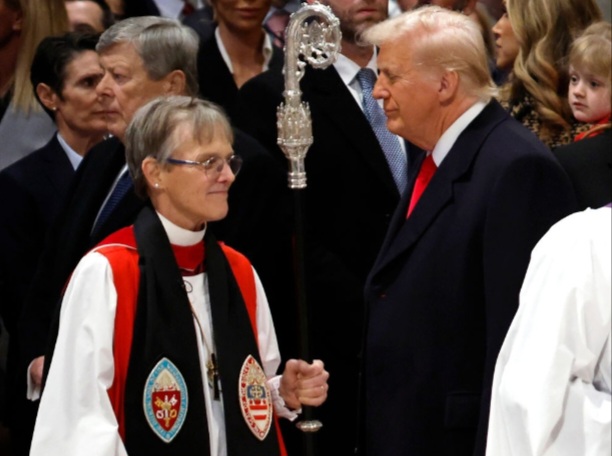On Wednesday, President Donald Trump criticized Bishop Mariann Edgar Budde, who had delivered a sermon addressing concerns about immigrants and LGBTQ+ children during a National Cathedral service the day before. In a post on Truth Social, Trump referred to the Episcopal Bishop of Washington as a “Radical Left hard-line Trump hater” and claimed she was “not very good at her job,” accusing her of politicizing her church in an “ungracious way” and demanding an apology.
During her sermon, Budde directly appealed to Trump, asking him to “have mercy upon the people in our country who are scared now,” including immigrants and LGBTQ+ youth. Trump, seated in the front pew, appeared uncomfortable as she spoke.
Budde also highlighted the fears of children in immigrant families and emphasized that most immigrants are law-abiding and contribute positively to society.
Her comments came after Trump signed executive orders recognizing only two genders as fixed at birth and directing immigration officers to intensify deportations. Budde urged Trump to consider the impact of these policies on vulnerable populations, stating, “I ask you to have mercy, Mr. President, on those in our communities whose children fear that their parents will be taken away.”
Budde’s sermon quickly gained national attention, eliciting both support and backlash. She reported receiving messages of gratitude from those who felt represented by her words, alongside threats and hateful comments, which she found disheartening. However, she remained resolute, telling saying, she would not apologize for speaking on behalf of marginalized groups.
In response to Trump’s remarks, Budde rejected the characterization of her as a “radical leftist” and clarified that she does not hate him. Addressing his critique of her leadership, she said, “That is for others to judge,” and reaffirmed her refusal to apologize.
Budde also noted that the real dangers lie with those facing deportation or discrimination, not herself. She expressed sadness over the culture of contempt in political discourse and emphasized the need for dignity, respect, and compassion in public life. Reflecting on her sermon, she described it as a respectful call to action for a more inclusive and merciful society.
















